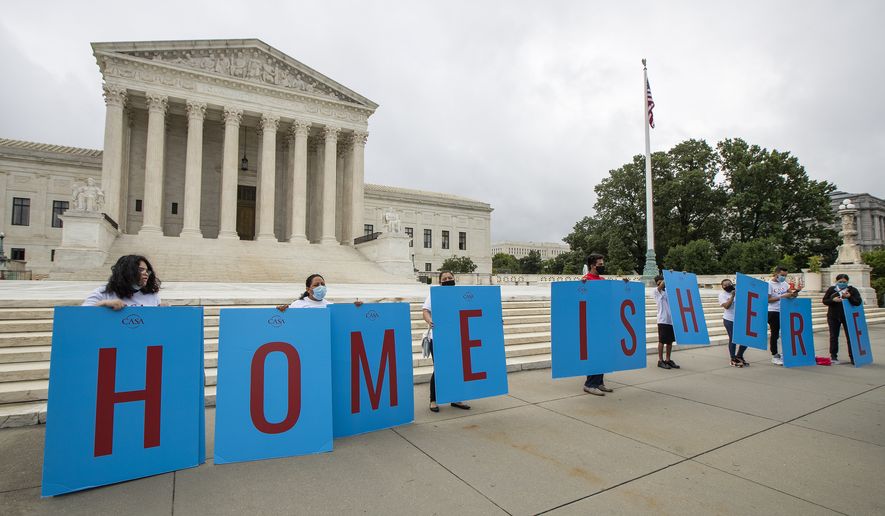Immigrant-rights advocates demanded Monday that Democrats revive a plan for a broad amnesty measure in President Biden’s budget bill, saying unless illegal immigrants see a full pathway to citizenship their allies will have less reason to turn out to vote in 2022.
The warning came as Democrats tried to finalize their version of the bill and reach for a vote in the House as soon as this week.
Activists are increasingly dismayed by what they’re seeing in the negotiations, with Mr. Biden’s original plans to offer a full pathway to citizenship to most illegal immigrants now reduced to a 10-year tentative legal status. It would be a shield from deportation and bring work permits but offers none of the permanence longtime illegal immigrants say they’ve earned.
“Democrats, what are you waiting for? Hold the line and provide the permanence that 11 million of our neighbors, friends and family need,” said Murad Awawdeh, executive director of the New York Immigration Coalition. “There is no building back anything without us. Period.”
The immigration debate is part of Mr. Biden’s “Build Back Better” budget bill, which would pump hundreds of billions of dollars into combating global warming and revamp social safety net programs, with the federal government funding universal preschool programs and expanding health care options.
The cost — at least $1.75 trillion, according to the White House’s estimates — would be covered chiefly by tax increases, with some savings coming from lower drug prices and stricter enforcement of tax laws.
Democrats had originally wanted to include citizenship rights for most of the country’s 11 million illegal immigrants but saw the Senate parliamentarian shoot down two different plans to do just that. The parliamentarian ruled the citizenship provisions were too big a policy change to shoehorn into the budget debate.
Senate Democrats have returned to the parliamentarian with a Plan C, which would grant “parole” to most illegal immigrants for up to 10 years. That would give them tentative legal status and access to work permits and possibly some other taxpayer benefits, but no defined pathway to permanent status.
Party leaders say that’s the best they can do given the constraints of the budget and the tiny majorities Democrats currently enjoy in the House and Senate.
Some immigration groups embraced the watered-down plans, but a number of groups with deep ties to key immigration communities say it’s not good enough.
Angelica Salas, executive director of the Coalition for Humane Immigrant Rights in Los Angeles, said illegal immigrants have been promised action for decades, yet always get left on the cutting floor.
“On Election Day, our communities, our mixed-status families, Latinos, Black immigrants, new citizens — they’re going to be looking at whether or not Democrats delivered, and so for us immigration is no different than all other issues on which our families make decisions on whether to be motivated to go out and vote,” she said during a virtual press briefing Monday.
She added: “The Republican side is very clear. They’re going to use immigration to rally up their base. The question for Democrats: Are you going to provide the results that will rally your base? And we are your base.”
Ms. Salas and other activists want to see the budget include what’s known as “registration,” a process in existing law where migrants who arrived before 1972 can apply for legal permanent residence, or a green card, even if they are in the country unlawfully. Activists want to see the 1972 date updated to 2010.
That was one of the plans derailed by the parliamentarian.
Activists say Senate Democrats should sidestep the parliamentarian and have Vice President Kamala Harris or another presiding officer rule that registration is allowed under budget rules.
House leaders had the registration plan in their bill, then took it out earlier this month and substituted the parole plan instead, figuring it was a more realistic option.
That will cost them the backing of a few Democrats who have said they cannot vote for something short of citizenship. But as of now, it’s not enough to sink the bill.
Indeed, many Democrats who had vowed support for a path to citizenship now say the tentative legal status parole offers is the best they can get, given the confines of the debate.
The cost of the registration plan and the parole plan are similar, at about $100 billion over the next decade. If either is included in the final bill, it would raise the price tag to $1.85 trillion, according to the White House’s estimates.
Activists say with an already tricky election cycle looming for Democrats, they shouldn’t risk demoralizing immigration-minded voters.
“Our communities turned out in unprecedented numbers across the nation to deliver. Not just the White House, the Senate and the House, to Democrats,” Mr. Awawdeh said. “In this moment what they are doing is saying, ’Thanks but no thanks.’ What we need them to do is to deliver.”
• Stephen Dinan can be reached at sdinan@washingtontimes.com.




Please read our comment policy before commenting.